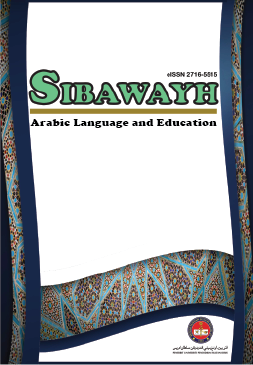النمذجة المفاهيمية للغة: إسهامات اللسانيات المعرفية في سياق العلوم المعرفية
Conceptual Language Modeling: Cognitive linguistics contributions in the context of cognitive sciences
DOI:
https://doi.org/10.37134/sibawayh.vol1.2.1.2020Keywords:
cognitive linguistics, cognitive sciences, memory, linguistic perception, linguistic achievementAbstract
Cognitive science is concerned with describingthe preparations and the fundamental abilities of human mind, explaining and standardizing them: language rationalization, awareness, kinetic coordination and planning, curricula and concepts. In spite of their participation in the cognitive subject that makes them engage intentionally in the field of cognitive sciences, they are able to build for themselves, cross-pollination of several specialties, a system of advanced scientific models. In this article, we will show how the conceptual models of language emerge in the context of cognitive sciences and the way in which they evolve through the multiplicity of sciences contributing to their structure and the development of this epistemological approach, including the concept of language processing (perception and achievement) and the concept of memory as a crossing bridge between them, from models on a multidisciplinary background, to describe the effectiveness of the self in its engagement with the subjects of the surrounding world, and also to clarify the nature of the mental entities that are built and the forms according to which they are organized. We analyzed the subject from a cognitive linguistics perspective, with the use of cognitive disciplines that demonstrate other aspects.
Downloads
References
الطايفي البرنوصي، حسبية، (2019). ذاكرة العمل واللغة: بين إواليات المعالجة والصورنة. ضمن: جمال بوطيب وأحمد شراك (منسقين): الذاكرة والبناء الثقافي: (317-340). أشغال المؤتمر الدولي السنوي لمؤسسة مقاربات (14 و15 و16 مارس 2019). فاس: مؤسسة مقاربات للنشر والصناعات الثقافية ومختبر التواصل الثقافي وجمالية النص بكلية الآداب والعلوم الإنسانية – ظهر المهراز.
الطايفي البرنوصي، حسبية؛ والزهري، عزيز؛ وزغبوش، بنعيسى؛ وبوعناني، مصطفى. (2016). الدرس الفونولوجي بالمرحلة الابتدائية: دراسة وصفية تقويمة. فاس: أبحاث معرفية، 7، 245-266.
الطايفي البرنوصي، حسبية؛ وزغبوش، بنعيسى؛ وبوعناني، مصطفى. (2015). الذاكرة: بين إسهامات التطور التقني ومتغيرات معالجة اللغة. ضمن: بنعيسى زغبوش وإسماعيل علوي (تنسيق وتقديم): اللغة والذاكرة والكفاءات. (105-140). فاس: منشورات مختبر العلوم المعرفية (سلسلة كتب: 7).
بوعناني، مصطفى. (2004). التسنين الفونولوجي والمسارات المعرفية للإنجاز اللغوي العربي. مجلة الطفولة العربية: 5 (19) (41-51.
بوعناني، مصطفى. (2015). الإنجاز اللغوي العربي: بين نسقية التنوع الصوتي وأجرأة الانتظام المعرفي. ضمن بوعناني مصطفى وبنعيسى زغبوش (تنسيق وتقديم): اللغة والمعرفية: بعض مظاهر التفاعل المعرفي بين اللسانيات وعلم النفس: (103-155). إربد: عالم الكتب الحديث.
تيبرغيان، غي؛ صباح، جيرارد؛ ديكليه، جان-بيار؛ أبدي، هيرفيه؛ ليفيه، بيار؛ جانيرو، مارك؛ جورجييف، نيكولا؛ بانت، جويل؛ لوني، جان-فرانسوا؛ (2013). قاموس العلوم المعرفية: فرنسي-عربي. ترجمة: جمال شحيّد. بيروت: المنظمة العربية للترجمة. الطبعة 1.
(زغبوش، بنعيسى. (2003). نماذج تقييس الأنظمة الاصطناعية للغة الطبيعية. البحرين: مجلة العلوم التربوية والنفسية: 2 (4): (39-69.
زغبوش، بنعيسى. (2008). الذاكرة واللغة: مقاربة علم النفس المعرفي للذاكرة المعجمية وامتداداتها التربوية. إربد: عالم الكتب الحديث.
زغبوش، بنعيسى؛ بوعناني، مصطفى؛ سفير، عبد النبي. (1997). نماذج البحث المعرفي ونمذجة العمليات المعرفية. فاس: مجلة
معرفية: 1: (5 -(37.
عابد الجابري، محمد. (1998). مدخل إلى فلسفة العلوم: العقلانية المعاصرة وتطور الفكر العلمي. بيروت: مركز دراسات الوحدة العربية. الطبعة 4.
همام، محمد. (2012). التداخل المعرفي: دراسة في المفهوم. ضمن: رائد جميل عكاشة (المنسق) ومجموعة من الباحثين. التكامل المعرفي: أثره في التعليم الجامعي وضرورته الحضارية. هرندن: المعهد العالمي للفكر الإسلامي: 55-107. الطبعة 1.
آيت دوصو، عبد الرحيم. (1990). مصطلحات علوم التربية (عربي ـ فرنسي ـ إنجليزي). مطبعة الرسالة. بدون طبعة.
Baddeley, A.D. & Hitch, G. (1974). Working Memory. In G. Bower (Ed.). The Psychology of Learning and Motivation. New York. Academic Press: 8: (47-90).
Baddeley, A.D. (2000). The episodic buffer: A new component of working memory? Trends in Cognitive Science: 12: (417-423).
De lahaie, M. (2009). L’évolution du langage de l’enfant de la difficulté au trouble. Saint-Denis: Inpes.
Dortier, J. –F. (2014). Le cerveau et la pensée: le nouvel âge des sciences cognitives. Tielt: Sciences Humaines Ouvrages De Synthèse.
Drouin, A. –M. (1998). Le modèle en questions, Paris: INRP: 7: (1-20).
Flower, L.S. & Hayes, J.R. (1980). The dynamic of composing: Making plans and juggling constraints. In L.W. Gregg &E.R. Steinberg (Ed.). Cognitive processes in writing. Hillsdale (NJ), Erlbaum: (31-50).
Houdé, O. ; Kayser, D. ; Koening, O. ; Proust, J. & Rastier, F. (1998). Vocabulaire de sciences cognitives : Neuroscience, Psychologie, Intelligence artificielle, Linguistique et philosophie. Paris : PUF.
Kellogg, R. T. (1996). A model of working memory in writing. In M.C. Levy & S.E. Ransdell (Eds.). The science of writing. Theories, Methods, Individual Differences and Applications: (57-71). Mahwah, NJ: Laurence Erlbaum.
Lemaire, P. (2006). Abrégé de Psychologie Cognitive. Bruxelles : De Boeck.
Levy, C. M. & Marek, P. (1999). Testing components of Kellogg’s multicomponent model of working memory in writing: The role of the phonological loop. In M. Torrance & G. C. Jeffery (Ed.). The cognitive demands of writing. Amsterdam: University Press: (13-24).
Levy, C. M. & Ransdell, S. (1996). The science of writing: Theories, methods, and applications. Mahwah (NJ): Erlbaum.
Majerus, S. ; D'Argembeau, A. ; Martinez-Perez, T. ; Belayachi, S. ; Van der Linden, M. ; Collette, F. ; Salmon, E. ; Seurinck, R. ; Fias, W. & Maquet, P. (2010). The Commonality of Neural Networks for Verbal and Visual Short-term Memory. Journal of Cognitive Neuroscience : 22: (2570-2593).
Rouveret, A..(2004) Grammaire formelle et cognition linguistique. In Fuchs, C. (éd). La linguistique cognitive. Paris. Ophrys/ la Maison des sciences de l’homme : (27-71).
Ruchkin, D. S. ; Johnson, R. Jr. ; Canoune, H. ; Ritter, W. & Hammer, M. )1990b.( Multiple source of P3b associated with types of information. Psychophysiology: 27 (2): (157-176).
Ruchkin, D. S. ; Johnson, R. Jr. ; Canoune, H. & Ritter, W. )1990a.( Short-term memory storage and retention: an eventrelated brain potential study. Electroencephalography and Clinical Neurophysiology: 76: (419-439).
Ruchkin, D.S. ; Johnson, R. ; Grafman, J. ; Canoune, H. & Ritter, W. )1992.( Distinctions and similarities among working memory processes: an event-related potential study. Cognitive Brain Research: 1: (53-66).
-Segui, J. Ferrand, L. (2000). Leçons de parole. Paris: O. Jacob.
Sun, R. (2009). Theoretical status of computational cognitive modeling. Cognitive Systems Research: 10 (2): (124-140).
Willett, G. Paradigme, théorie, modèle, schéma: qu’est-ce donc? (1996). Communication et organisation. URL: http://journals.openedition.org/communicationorganisation/1873;
DOI: 10.4000/communicationorganisation.1873





